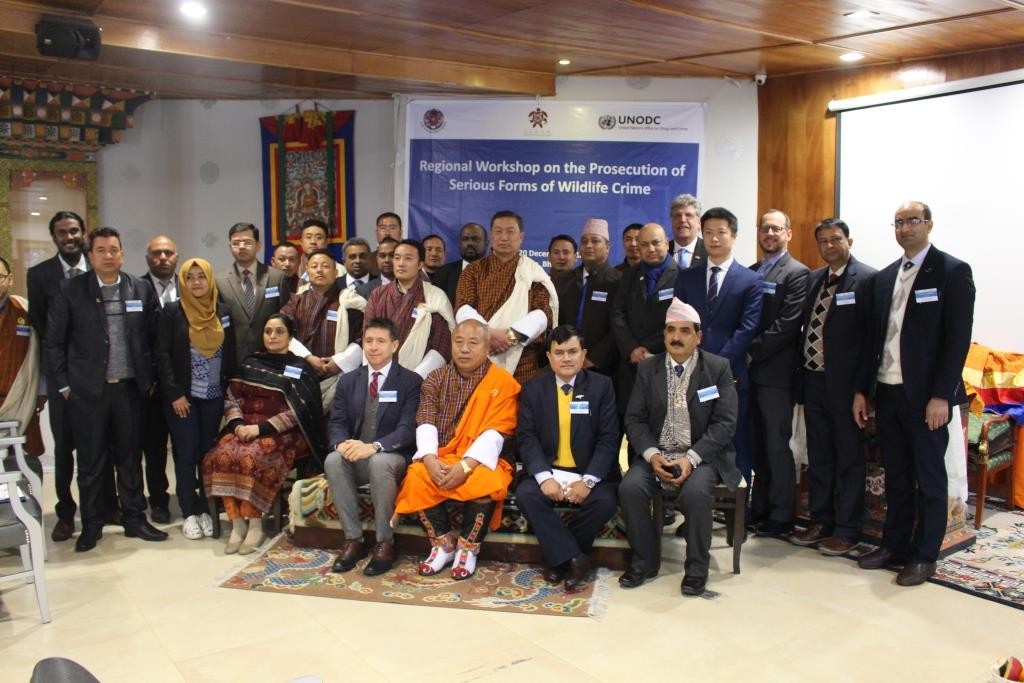Regional workshop on the prosecution of serious forms of wildlife crime completed

South Asia Wildlife Enforcement Network (SAWEN) in collaboration with the Government of Bhutan, United Nations Office on Drugs and Crime (UNODC), WWF Nepal and US Department of State’s South Asia Regional Environment Office successfully organized a ‘Regional workshop on the prosecution of serious forms of wildlife crime’ on 18-20 December 2018 in Paro, Bhutan. The program aimed to familiarize the wildlife crime and its control issues among the prosecutors and judges of the SAWEN member countries as well as to support in legal actions against wildlife crime in the region.
Inaugurating the program Honorable Minister Mr. Lyonpo Yeshey Penjor, Ministry of Agriculture and Forests, recalled the vast richness of cultural and biological diversity in South Asia and stressed out the threats on these natural resources from organized criminal activities in the region and beyond. He has emphasized the role of law enforcement agencies in combating wildlife crime and requested to act ahead of the poachers and smugglers.
Mr. Kinley Tshering, SAWEN Focal Person of Bhutan welcomed all the delegates coming to participate in the program and underlined the importance of the workshop that the exchange of legal and technical ideas and strict prosecution techniques will be a big step in strengthening our initiatives for curbing wildlife crime in the region.
Mr. Jorge Rios, Chief of UNODC's Global Programme for Combating Wildlife and Forest Crime, highlighted that the multifarious challenges emanating primarily by poaching and trafficking in wildlife and their parts along with region’s poverty, population growth and many environmental changes against the national and international laws have emerged as one of the most significant challenges in conserving biodiversity in the region. He further opined that prosecutors and judges play a crucial role to trigger more successful court cases at national level and also to promote legal assistance among countries to sustain broader cases against transnational syndicates.
Closing the inaugural program, Mr. Man Bahadur Khadka, Chief Enforcement Coordinator of SAWEN, recognized the constructive role of legal entities working in combating wildlife crime as ultimate verdict provider to minimize such crime and pointed out that technical knowhow on wildlife crime and its control to prosecutors and judges would have added advantage to make informed decision in related cases. In presence of Honorable minister, Mr. Khadka kindly requested the Royal Government of Bhutan for early adoption of the SAWEN Statute and invited the delegates of Afghanistan and Maldives for forwarding the Statute adoption process in respective country. Highlighting the ongoing activities from the SAWEN Secretariat and existing institutional status, Mr. Khadka, requested all the member countries and partner organizations to support SAWEN for sustainable financial resources and strengthening of SAWEN endowment fund.
More than 20 delegates from office of the attorney, judicial academy, forests and wildlife from the six SAWEN member countries – Afghanistan, Bhutan, India, Maldives, Nepal and Sri Lanka-were participated in the program. Representatives from the collaborative agencies of the program also participated in the program. Facilitators and resource persons from US agencies and UNODC, covered the issues including but not limited to i) Wildlife poaching and trafficking; ii) Participating countries’ issues and commonalities; iii) Evaluating the seriousness of wildlife crimes and identifying potential alternative criminal charges; iv) Universal principles of criminal investigation and prosecution of wildlife cases; v) International assistance in prosecutions; vi) Mutual legal assistance; vii) UN Convention against Transnational Organized Crime; and viii) CITES overview.
Representing each country delegation, a presentation was delivered and shared the prosecution processes; scenario of past five years on wildlife crime and conviction; laws, policies, regulations and guidelines practiced in wildlife crime cases; investigating agencies for wildlife offenses; challenges in the prosecution of wildlife crimes; and also way forward. Sharing of national practices, lesson learns and good practices from each of the participated country enriched the workshop to explore possible way out in close consultation. During the workshop, the countries come up with short term plan that can be accomplished in coming six months period. The plans include strengthening and capacity building of law enforcement agencies and judiciary; sensitization and awareness to judges and general public; inter-agency cooperation and more. An informal network of prosecutors and judges was formed that will be useful to exchange the information and experience among each other. This will be a mechanism for further communication and cooperation.
A follow up workshop will be organized similar to this workshop. The SAWEN Secretariat, as one of the organizers, looks forward to see the outcome of the workshop as envisioned in this workshop and believes that it will create profound base for combating wildlife crime with support of prosecutors and judges.


